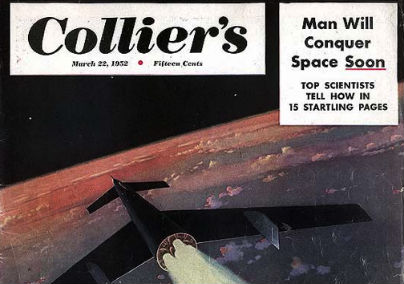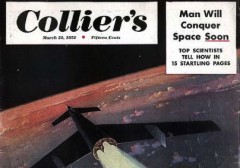
There’s an article by science fiction author Gregory Benford in the February issue of Reason Magazine (also available online at Reason.com). I hadn’t realized it, but Benford has written three other articles for Reason (see below for a list of the others).
In the article, Benford briefly discusses the role of Nazi SS officer and rocket scientist Wernher von Braun 1 in the American government’s space program, from his popular promotion of his vision of man conquering space (interesting choice of war metaphor) to his running the Apollo program.
Benford discusses Von Braun’s vision for how man will conquer space, a vision that strikes me as impractical and expensive and that still lingers in NASA today. He also highlights the decline of NASA and its “ruinously expensive” nature of the American government’s space shuttle program, which suffered catastrophic failures and kept going long past its planned obsolescence.
Though Benford says that Von Braun’s vision lives on, I’m not so sure of that. If he means Von Braun’s general vision of man “conquering” space, then yes, that vision is not dead. If he means Von Braun’s more specific vision of how this is to be accomplished, then no, I do not think that vision will live on.
He then goes on to discuss how science fiction authors have reacted to the rising and falling fortunes of the American government’s space program. It’s interesting how most science fiction authors couldn’t envision space exploration without NASA, equating the two, while a few others foresaw NASA’s failure and advocated private space exploration as a viable alternative.
Benford notes that science fiction “is becoming more economically literate, Stephen Baxter believes, because the history of post-1972 NASA has sobered the writers.” This is a welcome change as, contra Arthur C. Clarke, economics is a science. It’s a shame that so many science fiction authors have worked hard not to get the science wrong yet have ended up writing stories that make no economic sense.
More Reason Articles by Gregory Benford
- Choosing Our Own Future, Gregory Benford, April 23, 2009
- Theological Science Fiction, Gregory Benford, May 23, 2003
- Leaping the Abyss, Gregory Benford, April 1, 2002
Updated 2/2/2012
Reason also published a selected list of space science fiction compiled by Benford, ranging from Robert Heinlein to Joan Slonczewski:
As NASA’s manned space efforts shrank, starships became more the stuff of science fiction. The following envision different paths to expansion into space.
Voyage, by Stephen Baxter (1996): An epic saga of America’s might-have-been. If President John F. Kennedy had lived, we could have sent a manned mission to Mars in the 1980s.
Coyote, by Allen Steele (2002): Gallant misfits, led by a spaceship captain named Robert E. Lee, steal a starship. They flee a declining Earth rife with dictatorship and technophobia to found a new society on a new world.
Time for the Stars, by Robert A. Heinlein (1956): Identical twins are enlisted to be the human radios that will keep starships in contact with Earth, but one of them has to stay behind while the other explores the depths of space. Einstein intervenes.
Earth, by David Brin (1990): A small black hole escapes from the lab that made it, and Earth is in danger of being hollowed out. Wracked by gravity lasers from core to pole, Earth explores whether humanity and freedom can survive.
Hull Zero Three, by Greg Bear (2010): Interstellar planet hunting on an enormous damaged starship. Strange things have come to live in the starship’s vast corridors on the long voyage.
The Highest Frontier, by Joan Slonczewski (2011): College in an orbital space habitat. Global climate change and advanced social change amid an intriguing biotech future.
A Fire Upon the Deep, by Vernor Vinge (1992): Supersmart entities rule part of our galaxy. Human minds remain limited, but our lot is not as bad as that of creatures in the Unthinking Depths, where only simple animals can function. Add conflicts and stir.
Mars Crossing, by Geoffrey A. Landis (2000): Adventurers endure an agonizing trek halfway across the surface of Mars to reach a ship designed to carry only half their number. A rugged, inventive tale.
Red Thunder, by John Varley (2003): A Chinese spacecraft, Heavenly Harmony, threatens to land on Mars a few days before the U.S. shuttle gets there. A tribute to Heinlein, the space program, and American ingenuity.
Red Mars, Green Mars, Blue Mars, by Kim Stanley Robinson (1992–1996): A trilogy about founding a Mars colony. The settlers fragment into political factions which differ on how to alter the Mars environment and govern the first society independent of Earth.
Benford doesn’t call Von Braun a facilitator of mass murder, but does mention that he ran “Adolf Hitler’s V-1 and V-2 programs, which sent more than 10,000 rockets into England in 1944 and 1945.” ↩















